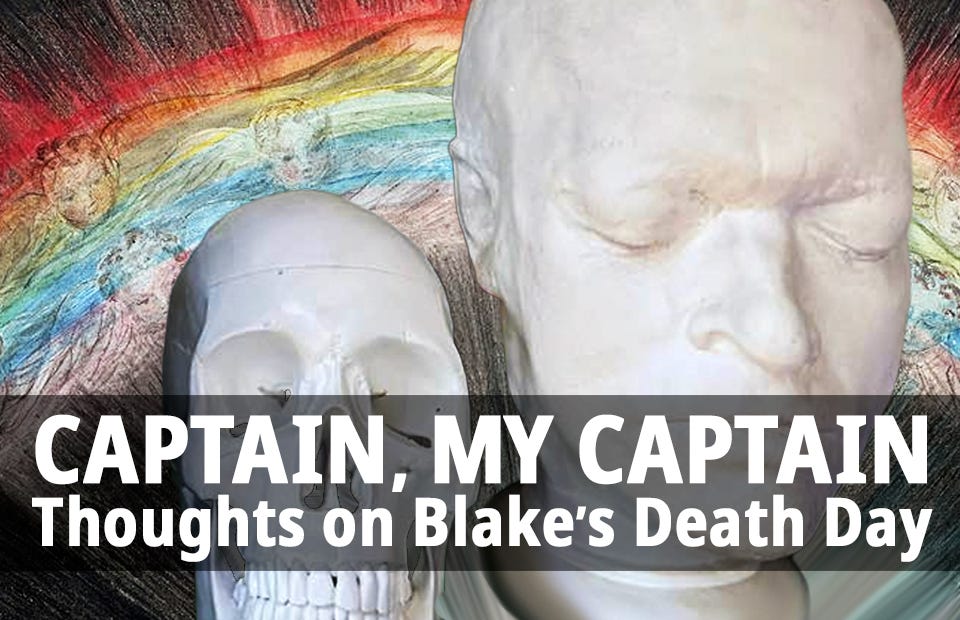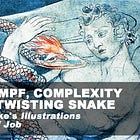Captain, my Captain! Thoughts on Blake's Death Day
As we approach the 200ᵗʰ anniversary of Blake's death (12th Aug 1827), what can we conclude about his legacy and impact today? A starter pack...

So then because thou art lukewarm, and neither cold nor hot,
I will spue thee out of my mouth
Revelation 3:16 KJB
I doubt that I have thought about anyone as much as I have thought about William Blake. Today, being the anniversary of his death, I find myself thinking about him some more. It is now fifteen years since I started to sink myself into Blake, after reading him and being overwhelmed… like taking a great lungful of wet sea air after a lifetime breathing wood smoke through a straw.
Blake scholars like to quote him:
I give you the end of a golden string
Only wind it into a ball
It will lead you in at Heavens gate
Built in Jerusalems wall1
But that is not how he seems to me. Once you can read Blake openly, any page is a portal through which you might momentarily be ejected from Babylon into contact with something more firmly grounded because more overdeterminedly obscure to the tidy mind. Something more like the real. In Blake, everything is everything else: no string-winding is required to get around. How he liked to tease!
The Prophets Isaiah and Ezekiel dined with me, and I asked them how they dared so roundly to assert. that God spake to them... Isaiah answer'd. I saw no God. nor heard any, in a finite organical perception; but my senses discover'd the infinite in every thing, and as I was then perswaded… that the voice of honest indignation is the voice of God... Then I asked: does a firm perswasion that a thing is so, make it so? He replied. All poets believe that it does, & in ages of imagination this firm perswasion removed mountains; but many are not capable of a firm perswasion of any thing.
William Blake, The Marriage of Heaven and Hell2
You can’t call Blake’s triumph merely literary or artistic: not because it isn’t that, but because it is more. The work on the page is inseparable from the character of the mid-sized cockney Goliath who engraved, inked and painted it alongside his wife. It is Blake’s character that is his fundamental invention. Blake knew; he knew that he knew, and there was no point combing through the weeds with anyone who thought they knew better. It is this character we need, more than a new hermeneutics for reading his work.
Which brings me to my point: have you met anyone who didn’t like Blake? Someone who knows anything at all about him and doesn’t like the sound of it? Me neither. And there is your problem: Blake is too popular.
That’s right, Blake is too popular. When Blake is popular right across the board, when he means anything you fancy to absolutely everyone, then he means nothing anymore. Somehow, we have made Blake mean nothing.
Blake means nothing because people all find something somehow comforting in him: to the nationalist, he has created the patriotic hymn, Jerusalem; to the academic and journalist, his views can be made easily compatible with your own because no one is checking; to the New Age, Blake is the herald of the artistic imagination, and thus practically a patron Saint. No one has any interest in arguing with anyone else’s views because those views exist as comfort blankets rather than goads. Collectively, we are no longer capable of forming “a firm perswasion of any thing”. Taken in different directions by everyone who these days lays a hand on him, it is Blake’s image, his presence among us, that starts to unravel ‘like a golden thread’.
We need goading. We need people who not only read Blake, but who take him seriously: “Rouze up O Young Men of the New Age! set your foreheads against the ignorant Hirelings! For we have Hirelings in the Camp, the Court, & the University: who would if they could, forever depress Mental & prolong Corporeal War.”3
NB. When people try to convince you that William ‘nor shall my sword sleep in my hand’ Blake opposed corporeal war and recommended ‘mental war’ instead, they are telling you that they wouldn’t take sides in a real war or revolution or support one side against the other, or in a physical confrontation with fascism. Contrary to the impression you may have received, they aren’t telling that they actually intend to fight ‘mental war’ instead… they have no such intention. They merely want to maintain the illusory social and intellectual peace that forms the background to their careers.
What do we want?
Mental War!
When do we want it?
Now!
In short: Happy death day, Captain!





